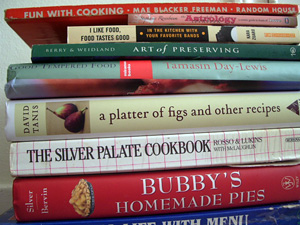 Your brownies reign supreme. Your roast chicken makes Zuni Cafe look like Safeway's rotisserie. Proposals--not all tongue-in-cheek--pile up when your strawberry-rhubarb pie arrives. Your friends, your family, your blogging buddies all agree: you should write a book. They'd buy it, their friends would buy it, Ina and Martha would arm-wrestle over who would get you on her show first.
Your brownies reign supreme. Your roast chicken makes Zuni Cafe look like Safeway's rotisserie. Proposals--not all tongue-in-cheek--pile up when your strawberry-rhubarb pie arrives. Your friends, your family, your blogging buddies all agree: you should write a book. They'd buy it, their friends would buy it, Ina and Martha would arm-wrestle over who would get you on her show first.
Don't you wish it was that easy?! The first thing to know about writing a cookbook is that publishing is a business, and businesses have to make money to stay in business. They do this by paying attention to a whole lot of things, from profit and loss projections to trend research. It helps to realize, right from the beginning, that your book will get published only if a bunch of people (and not just editors, but sales and marketing folks too) can prove beyond a reasonable doubt that it will sell and make money.
Of course, if you just want to give out your favorite recipes to family and friends, it's easier than ever to self-publish, especially as an on-demand or e-book. But if you want the glamour of a Library of Congress number and a place on your local bookstore's cookbooks shelf, you'd better toughen up.
Here, words to the wise, part 1:
1. It's a cookbook, not the Great American Novel. Yes, some people buy (and read) cookbooks for the writing, just like some people buy Playboy for the articles. But, just like Playboy, many more people buy it for the pictures, or in this case, the recipes. Content editors, copy editors, proofreaders, and yes, even your editor's phone-answering assistant will be slicing and dicing your precious prose. Believe it or not, they're actually making you sound better. If you can't hand over this kind of control, stick with self-publishing.
2. Learn to write recipes like the pros. This means being consistent from start to finish. For example, ingredients should always be listed in the order in which they're going to be used. Measurements should be written the same way each time, not teaspoon on one page and tsp the next. Each time you saute an onion or roll out a batch of pastry dough, it helps to trot out the same description in the same language. Consider your audience, too. If you're a professional pastry chef, you probably work your recipes out by weight-- easier and much more consistent, of course, except that most American home bakers measure by teaspoons and cups, not grams and ounces.